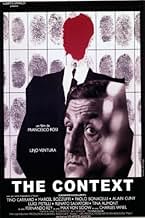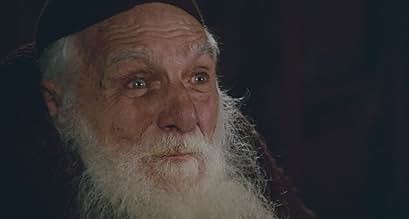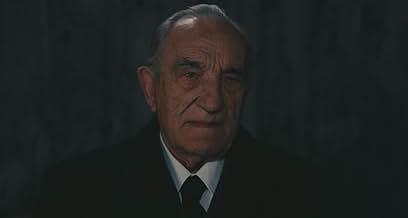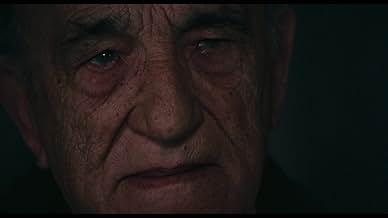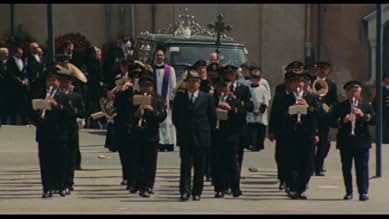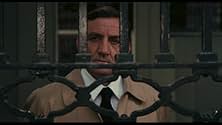An investigation of the judges' assassinations reveals a political background.An investigation of the judges' assassinations reveals a political background.An investigation of the judges' assassinations reveals a political background.
- Awards
- 5 wins & 6 nominations total
7.23K
1
2
3
4
5
6
7
8
9
10
Featured reviews
Brilliant and gripping for the first 2/3, then not so much....
The opening sequence and what follows are breathtaking -- every frame a jewel, and the messaging completely in sync with what Italy was going though during in the anni di piombo, the years during which life was controlled by the Christian Democratic party, the Mafia and the Catholic Church and when everyone else who mattered was more or less on the take.
Based on a novel by Leonardo Sciascia, the Sicilian bard of those years, the early sequence actually has the feel of a Simenon novel -- crimes are being committed, judges are being shot, and the best detective in Italy is being sent to investigate, landing in Sicily (unnamed, but clearly identified) as on a remote planet, The detective is played by the tremendous Italo-French actor Lino Ventura (who appears in just about any French film noir of the 60s and 70s that you can think of), whose face (like so many in this face-focused film) is almost a novel in itself. Nobody does faces like Francesco Rosi, and what faces he has to work with here, including not just Ventura's, but Fernando Ray's, Max von Sydow's, and many others that are at least as compelling, if not as instantly recognizable.
So for the first two-thirds of the film, the Simenon-like parts, with the Ventura character, Ispettore Rogas, trying, like Commissaire Maigret, to parse an alien environment and figure what's going on, the film is gripping. Then Rogas returns to Rome, and the plot becomes much more confusing. Suddenly we're no longer dealing with the crime Rogas thinks he has pretty much figured out, if not completely solved, but with a huge conspiracy -- we're suddenly thrust into a political thriller, more Costa Gavras than Simenon, and into what seems uncomfortably like agitprop. The Communist party, the hard-line PCI, seems for a time to be the path to salvation, but in the end, not. Youthful protestors seem to offer hope, but the basic message seems to be that the neo-fascists are always there, ready to turn whatever seeming threat they face into an opportunity. Sound familiar? The release is timely, but in the end I found the message kind of muddled.
The 4K restoration is fantastically vivid, but, until the later parts, with its huge crowd scenes, the original material was already brilliant. The English subtitles are incomplete and at times distorting...nothing new there.
The restoration, now showing at NYC's indispensable Film Forum, must be seen, even if it can be frustrating in parts. I assume it will go out on the art-house circuit, and any film lover who can should grab the opportunity, even if that is only through streaming or the DVD that I assume will come out soon if it hasn't already. The first 2/3 will knock your socks off, and maybe it's me only who finds the rest a bit indecipherable. Guess I'll just have to go back and see it again.
Based on a novel by Leonardo Sciascia, the Sicilian bard of those years, the early sequence actually has the feel of a Simenon novel -- crimes are being committed, judges are being shot, and the best detective in Italy is being sent to investigate, landing in Sicily (unnamed, but clearly identified) as on a remote planet, The detective is played by the tremendous Italo-French actor Lino Ventura (who appears in just about any French film noir of the 60s and 70s that you can think of), whose face (like so many in this face-focused film) is almost a novel in itself. Nobody does faces like Francesco Rosi, and what faces he has to work with here, including not just Ventura's, but Fernando Ray's, Max von Sydow's, and many others that are at least as compelling, if not as instantly recognizable.
So for the first two-thirds of the film, the Simenon-like parts, with the Ventura character, Ispettore Rogas, trying, like Commissaire Maigret, to parse an alien environment and figure what's going on, the film is gripping. Then Rogas returns to Rome, and the plot becomes much more confusing. Suddenly we're no longer dealing with the crime Rogas thinks he has pretty much figured out, if not completely solved, but with a huge conspiracy -- we're suddenly thrust into a political thriller, more Costa Gavras than Simenon, and into what seems uncomfortably like agitprop. The Communist party, the hard-line PCI, seems for a time to be the path to salvation, but in the end, not. Youthful protestors seem to offer hope, but the basic message seems to be that the neo-fascists are always there, ready to turn whatever seeming threat they face into an opportunity. Sound familiar? The release is timely, but in the end I found the message kind of muddled.
The 4K restoration is fantastically vivid, but, until the later parts, with its huge crowd scenes, the original material was already brilliant. The English subtitles are incomplete and at times distorting...nothing new there.
The restoration, now showing at NYC's indispensable Film Forum, must be seen, even if it can be frustrating in parts. I assume it will go out on the art-house circuit, and any film lover who can should grab the opportunity, even if that is only through streaming or the DVD that I assume will come out soon if it hasn't already. The first 2/3 will knock your socks off, and maybe it's me only who finds the rest a bit indecipherable. Guess I'll just have to go back and see it again.
Astounding crime film!
What more can be said? This is one of the finest examples of Italian cinema I have seen. Gripping, intense and thought provoking. Not to mention fantastically acted, directed, edited, shot and produced.
The story revolves around Lino Ventura, Italy's No.1 homicide detective. He is called in onto the case of an assassinated judge and has to piece it together. As the movie proceeds more judges are killed by an unknown party....
What makes this movie shine more than anything is the plot, it's thicker than cement. When you think you have your finger pointed in the right direction, something else pops up and leads you in yet another direction... FANTASTIC!!!
The story revolves around Lino Ventura, Italy's No.1 homicide detective. He is called in onto the case of an assassinated judge and has to piece it together. As the movie proceeds more judges are killed by an unknown party....
What makes this movie shine more than anything is the plot, it's thicker than cement. When you think you have your finger pointed in the right direction, something else pops up and leads you in yet another direction... FANTASTIC!!!
Intentional obscurity
The good news first: Cadaveri eccellenti is now out on DVD. Which is how we came to see it again last night. - Second, my own two cents since I've just read the negative comments on the discussion boards, where people are actually wondering if this is the worst movie ever. No way! OK, my own approach to it was an uphill journey. First saw it ages ago because Tre fratelli and Cristo si è fermato a Eboli had impressed me. This one is quite different, and I didn't get a thing. Years later, I stumbled over the story it's based on: "The Context. A parody" by Leonardo Sciascia. Even readers only passingly familiar with Sciascia will realize that the baddies are never caught in his books, reflecting the realities of his native Sicily. Of all the books of his I've read, this one was the toughest, because evil is omnipresent and not identified with individuals. A parody perhaps, but a bitter one, and one he took a long time to finish because writing it distressed him. Rosi read it on a long journey and it hit him like lightning. Like Sciascia, he was interested in the ways power corrupts people. So that's what we have here: a relentless gallery of corrupt officials in every walk of life. Not only in the Mafia but also in the realms of politics, justice, the military and religion. Max von Sydow's character is as repellent as anything I've ever seen. The whole caboodle is not meant to be fully understood, and that's where a large part of that all-pervading sense of menace comes from. The locations are gorgeous - wish I knew where that bus stop was where Rogas watches the procession of high-and-mighties drive by. And those catacombs! Someone here said the location wasn't clearly identified, but given that both Sciascia and Rosi were Italian, and that the film features a map of Sicily rather prominently in one shot, I beg to differ. IMHO this is indeed Sicily. And bella Italia. Berlusconi may look more benign than certain of his predecessors but... oh, all right, all right, this ain't the Speaker's Corner. The rest is silence.
My favorite Italian film.
Does anyone know why this isn't on DVD?
Rosi always gives good opening sequences (see his "Carmen") and this one is the best.
This is the political thriller that should be listed even above those of Costa Gravas or The Manchurian Candidate, but is virtually unknown in America. When I saw it at an Italian film class in the late 90's not even the professor had actually seen it - ( though I had).
Rescreening this 1976 film in today's political/terror climate gives this film even more resonance.
Lino Ventura is the moral center of this unblinking look at Italian politics. He has the kind of "gravitas" of Bogart at his best. If you have any way of seeing this film, you won't be sorry.
If you enjoy it, check out Rosi's "Tre Fratelli" and Ricky Tognazzi's "L'Escorta" with similar subject matter.
FYI, Rosi (Dir) was an assistant to Visconti.
Rosi always gives good opening sequences (see his "Carmen") and this one is the best.
This is the political thriller that should be listed even above those of Costa Gravas or The Manchurian Candidate, but is virtually unknown in America. When I saw it at an Italian film class in the late 90's not even the professor had actually seen it - ( though I had).
Rescreening this 1976 film in today's political/terror climate gives this film even more resonance.
Lino Ventura is the moral center of this unblinking look at Italian politics. He has the kind of "gravitas" of Bogart at his best. If you have any way of seeing this film, you won't be sorry.
If you enjoy it, check out Rosi's "Tre Fratelli" and Ricky Tognazzi's "L'Escorta" with similar subject matter.
FYI, Rosi (Dir) was an assistant to Visconti.
Murder among politics
Am a fan of foreign cinema and wanted to finally see more of Francesco Rosi's films, having loved his film version of 'Carmen' for years. That became one of my favourite opera films after seeing it for the first time at a relatively young age getting into opera and still is, it's actually even better now with the few things that didn't quite do it for me on my very first viewing, like the opening, not being issues.
Enough of talking about that film and lets talk about his 'Cadaveri Excellenti' ('Illustrious Corpses'). Was expecting great things after hearing a lot of positive things about it and was not let down, it deserves every good thing that has been said about it and deserves to be better known and accessibly. Am a subjective person but that 'Illustrious Corpses' was not available on DVD for a while and is to this day still underseen is inexplicable, when films nowhere near as good and in some cases not good films not only have wider coverage and highly marketed but are shown on television far more and are popular on DVD.
Talking now about 'Illustrious Corpses' as a film, it looks wonderful with some of the most strikingly beautiful and atmosphere-filled cinematography of any Italian film that doesn't have Federico Fellini's name on it. Some of it makes for many beautiful and at times nightmarish imagery, the mummified bodies will give one the creeps. The locations are also cleverly used and have both exquisite allure and stark atmosphere (apologies for throwing around this word a lot, it is hard not to when it is to me a crucial element of a film and should be mentioned). The music is haunting and has presence, whether understated or more bold, without being too loud.
'Illustrious Corpses' is intelligently written and thought-provoking, thematically it is bold and brutally honest yet human. Its depiction of Italian politics may not be innovative as such but was, and still is, honest and really quite daring (in a way that nobody expects) for back then. The story is deliberate in pace yet to me was transfixing, with a slow burning tension to the thriller/mystery parts sustained brilliantly with nothing being what it seems and .
The opening sequence is one of the best beginnings of any film seen recently, and perhaps ever, not just in how incredibly shot but also the emotion and chills one feels watching it. Even more striking is the shocking and really quite powerful ending that ends not in a way one expects, some may not like it but for me that it didn't end conveniently, predictably or less downbeat was actually appreciated and it did not jar tonally like those potentially would. There is suspense and there is nothing given away too early, one is kept guessing throughout with not much to help us. The killings are unlenting and the characters compellingly real with a lead character written with such honesty that it makes the outcome even sadder.
Rosi directs exceptionally with impeccable style and sense of mood and gets the best out of his cast. Lino Ventura is in the lead role and smoulders unforgettably on screen, giving a performance of magisterial and brooding intensity. It is a performance that has garnered comparisons as being the Italian Robert Mitchum or Humphrey Bogart and one can see why. The other standout is Max Von Sydow, an actor so consistently great that it would have been very hard to get a bad performance out of him. A bad performance this is nowhere near close to being, instead it is repellent unrepentance at its most chilling yet nuanced, it is a masterclass of saying a lot without always saying much or anything and Von Sydow always was a master at this.
Concluding, superb film and deserves far more credit. 10/10 Bethany Cox
Enough of talking about that film and lets talk about his 'Cadaveri Excellenti' ('Illustrious Corpses'). Was expecting great things after hearing a lot of positive things about it and was not let down, it deserves every good thing that has been said about it and deserves to be better known and accessibly. Am a subjective person but that 'Illustrious Corpses' was not available on DVD for a while and is to this day still underseen is inexplicable, when films nowhere near as good and in some cases not good films not only have wider coverage and highly marketed but are shown on television far more and are popular on DVD.
Talking now about 'Illustrious Corpses' as a film, it looks wonderful with some of the most strikingly beautiful and atmosphere-filled cinematography of any Italian film that doesn't have Federico Fellini's name on it. Some of it makes for many beautiful and at times nightmarish imagery, the mummified bodies will give one the creeps. The locations are also cleverly used and have both exquisite allure and stark atmosphere (apologies for throwing around this word a lot, it is hard not to when it is to me a crucial element of a film and should be mentioned). The music is haunting and has presence, whether understated or more bold, without being too loud.
'Illustrious Corpses' is intelligently written and thought-provoking, thematically it is bold and brutally honest yet human. Its depiction of Italian politics may not be innovative as such but was, and still is, honest and really quite daring (in a way that nobody expects) for back then. The story is deliberate in pace yet to me was transfixing, with a slow burning tension to the thriller/mystery parts sustained brilliantly with nothing being what it seems and .
The opening sequence is one of the best beginnings of any film seen recently, and perhaps ever, not just in how incredibly shot but also the emotion and chills one feels watching it. Even more striking is the shocking and really quite powerful ending that ends not in a way one expects, some may not like it but for me that it didn't end conveniently, predictably or less downbeat was actually appreciated and it did not jar tonally like those potentially would. There is suspense and there is nothing given away too early, one is kept guessing throughout with not much to help us. The killings are unlenting and the characters compellingly real with a lead character written with such honesty that it makes the outcome even sadder.
Rosi directs exceptionally with impeccable style and sense of mood and gets the best out of his cast. Lino Ventura is in the lead role and smoulders unforgettably on screen, giving a performance of magisterial and brooding intensity. It is a performance that has garnered comparisons as being the Italian Robert Mitchum or Humphrey Bogart and one can see why. The other standout is Max Von Sydow, an actor so consistently great that it would have been very hard to get a bad performance out of him. A bad performance this is nowhere near close to being, instead it is repellent unrepentance at its most chilling yet nuanced, it is a masterclass of saying a lot without always saying much or anything and Von Sydow always was a master at this.
Concluding, superb film and deserves far more credit. 10/10 Bethany Cox
Did you know
- TriviaThe title refers to a party game, Cadavres Exquis (Exquisite Corpses) invented by the French Surrealists. Each person in turn would be handed a piece of paper folded accordion fashion so that only one narrow horizontal strip showed at a time. The person would draw a section of a human body but would not know what other people had previously drawn. At the end the paper would be unfolded to show the entire body, which would be a mixture of fat and thin, young and old, male and female, etc. The title therefore means that one is not able to use what happens as any guide to what will happen next.
- ConnectionsEdited into Lo schermo a tre punte (1995)
- How long is Illustrious Corpses?Powered by Alexa
Details
- Release date
- Countries of origin
- Language
- Also known as
- Izuzetni lesevi
- Filming locations
- Agrigento, Sicily, Italy(Judge's body laid on the road: 37.3052°N, 13.5751°E)
- Production companies
- See more company credits at IMDbPro
Contribute to this page
Suggest an edit or add missing content

